When I first wrote up instructions on how to organize a Science Hack Day, they were rather verbose. I was vacationing in Spain at the time and was probably a little too relaxed to get down to a brass tax quick-start guide. With a total of 28(!) Science Hack Days having taken place all around the world, I decided it was due time to revise the instructions and get to the most important steps that will help a soon-to-be organizer get started. Check 'em out and get to adding your city to the front page of http://sciencehackday.org!Instructions on how to organize a Science Hack Day in your city: http://sciencehackday.org/howto Science Hack Day SF 2013 by Matt Biddulph
Science Hack Day SF 2013 by Matt Biddulph
Seahack.org launches!
 I'm gleeful to announce the launch of Seahack.org, a directory of ways to participate in sea exploration!This launch comes on the five year anniversary of its companion site, Spacehack.org. It was five years ago, fresh out of NASA, that I created Spacehack.org. Soon after, I met Lisa Ballard, a planetary data hacker at the SETI Institute and we've been collaborating ever since. While Lisa and myself are known for being space geeks, we also love geeking out about what I call "creepy awesome sea slime". Space and the sea both offer seemingly endless alien worlds to explore....so, go check it out!
I'm gleeful to announce the launch of Seahack.org, a directory of ways to participate in sea exploration!This launch comes on the five year anniversary of its companion site, Spacehack.org. It was five years ago, fresh out of NASA, that I created Spacehack.org. Soon after, I met Lisa Ballard, a planetary data hacker at the SETI Institute and we've been collaborating ever since. While Lisa and myself are known for being space geeks, we also love geeking out about what I call "creepy awesome sea slime". Space and the sea both offer seemingly endless alien worlds to explore....so, go check it out!
Summarizing Science Hack Day SF 2013
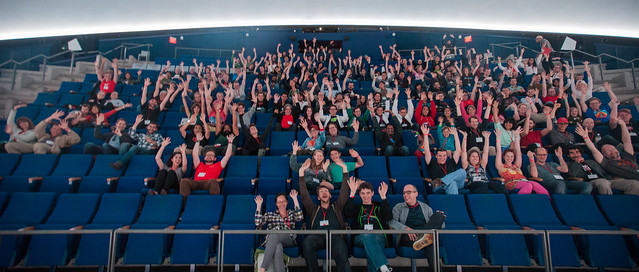 Science Hack Day SF attendees inside the Morrison Planetarium, photo by Matt BiddulphWow. The 4th annual Science Hack Day in San Francisco was our most epic yet! I was ecstatic to bring the most science hackers yet (200+) to the largest venue yet - the California Academy of Sciences! Each year of Science Hack Day SF has brought some of the most unexpected creations to life. Each year, I'm asked by reporters what I expect to see at Science Hack Day, and I struggle to explain that it's simply not something you can predict – and that's precisely what I love about it. When I talk to audiences about the beauty of it, I evoke a quote from John Peel that sums it up to me: "At the heart of anything good there should be a kernel of something undefinable. And if you can define it, or claim to be able to define it, then in a sense you've missed the point." The Science HackersThis year, people flew in from as far as China, Brazil and Canada to attend, while others made the trek from New York, Seattle and Portland. Most of us attended from around the San Francisco Bay Area, leaving our over-heated-by-the-SF-summer homes behind in exchange for the sensor-regulated conditions of the museum. Of the 217 people that attended, 40% were women. This shouldn't come as a surprise – there are SO many awesome women that I have met that I love to geek out with about science. I'm actually still aiming for 50%.Photos + VideosMatt Biddulph created a great set of photos on Flickr for your browsing pleasure. Fumi Yamazaki also took a huge amount of photos. Both are released under a Creative Commons license. You can also search for “sciencehackday” on Flickr to find many more taken by some of the attendees. Here's just a small sampling of some that I love from Matt Biddulph's collection:
Science Hack Day SF attendees inside the Morrison Planetarium, photo by Matt BiddulphWow. The 4th annual Science Hack Day in San Francisco was our most epic yet! I was ecstatic to bring the most science hackers yet (200+) to the largest venue yet - the California Academy of Sciences! Each year of Science Hack Day SF has brought some of the most unexpected creations to life. Each year, I'm asked by reporters what I expect to see at Science Hack Day, and I struggle to explain that it's simply not something you can predict – and that's precisely what I love about it. When I talk to audiences about the beauty of it, I evoke a quote from John Peel that sums it up to me: "At the heart of anything good there should be a kernel of something undefinable. And if you can define it, or claim to be able to define it, then in a sense you've missed the point." The Science HackersThis year, people flew in from as far as China, Brazil and Canada to attend, while others made the trek from New York, Seattle and Portland. Most of us attended from around the San Francisco Bay Area, leaving our over-heated-by-the-SF-summer homes behind in exchange for the sensor-regulated conditions of the museum. Of the 217 people that attended, 40% were women. This shouldn't come as a surprise – there are SO many awesome women that I have met that I love to geek out with about science. I'm actually still aiming for 50%.Photos + VideosMatt Biddulph created a great set of photos on Flickr for your browsing pleasure. Fumi Yamazaki also took a huge amount of photos. Both are released under a Creative Commons license. You can also search for “sciencehackday” on Flickr to find many more taken by some of the attendees. Here's just a small sampling of some that I love from Matt Biddulph's collection: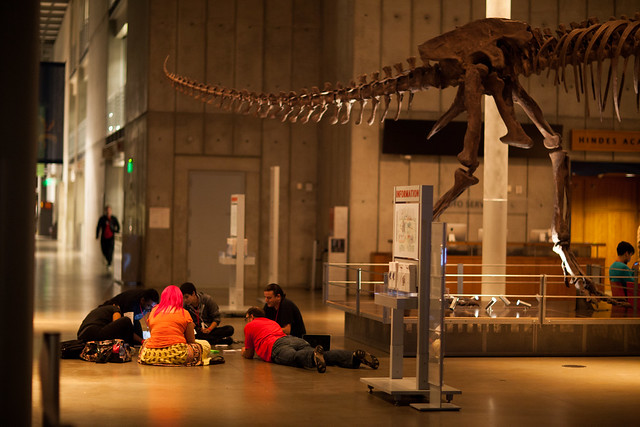 Science hackers playing Cards Against Science (created by David Harris during Science Hack Day!) underneath a T-Rex skeleton late at night
Science hackers playing Cards Against Science (created by David Harris during Science Hack Day!) underneath a T-Rex skeleton late at night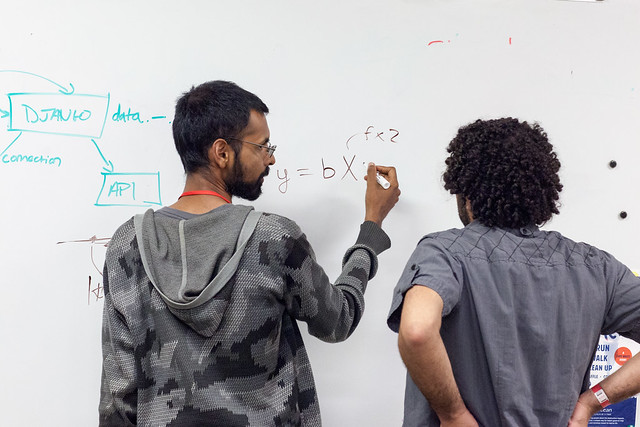 Math in the lab
Math in the lab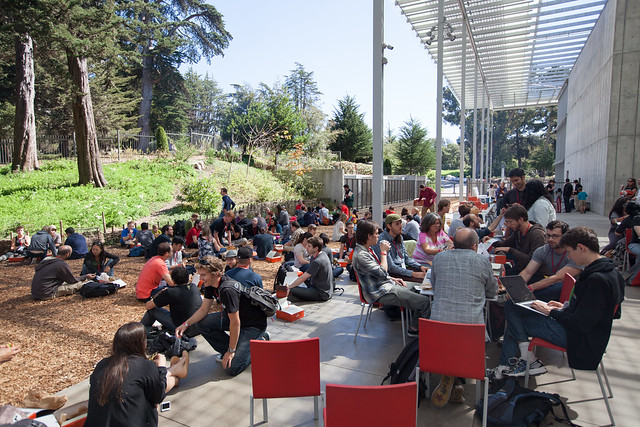 Lunch in the garden!
Lunch in the garden!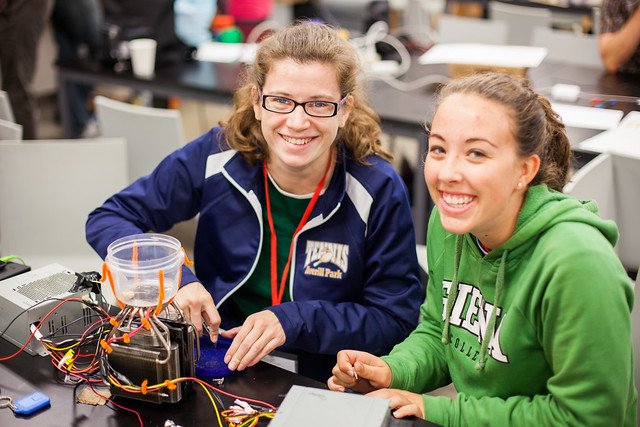 Working on a DIY cloud chamber
Working on a DIY cloud chamber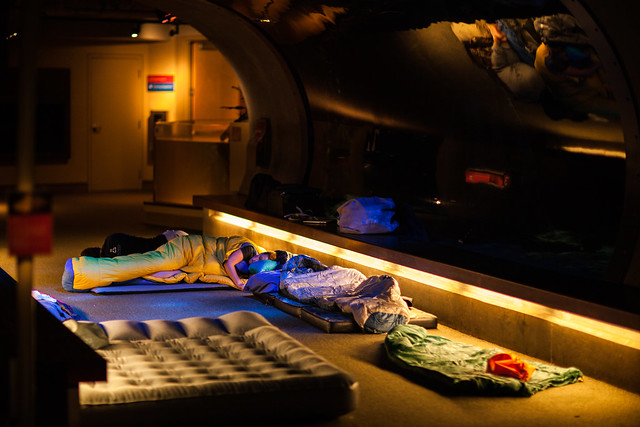 Sleeping over at the California Academy of Sciences' aquariumThe EventI can't begin to thank the California Academy of Sciences enough for donating their space to our small volunteer-run event! While prototyping takes center stage at Science Hack Day, I was excited to also up the ante on offering a great experience for everyone. The museum closed to the public at 5pm on the Saturday and we then had the place to ourselves. It's cheesy to say, but it did feel magical being able to wander around the exhibits and sea creatures with barely anyone there. In the evening, we all gathered in the planetarium as Ryan Wyatt took us on a unique tour of the universe and later headed to the living roof where astronomers pointed their telescopes and laser pointers to the sky. In the lobby, teams played Cards Against Science underneath the tail of a T-Rex and formed an impromptu tambourine band underneath the head of it. Others stayed up all night in the lab. Most eventually slept on sleeping bags and air mattresses in the aquarium or next to the penguins. Sleep didn't last long as we had to wake up at 6:15am with the animals - but we made the best of it by offering a morning yoga class (taught by my mother!), a WALL-E screening, and then by perfect timing, the recent SpaceX launch on the big screen. Waking up to a massive rocket launch was pretty exhilarating.The HacksYou can browse through all 38 hacks that were created over the weekend on the wiki (it also notes who received the coveted SCIENCE medals!). The People's Choice award went to Symphony of the Satellites who created this awesome companion video to their hack using KQED's green screen room.The ReactionsHere's just a few:
Sleeping over at the California Academy of Sciences' aquariumThe EventI can't begin to thank the California Academy of Sciences enough for donating their space to our small volunteer-run event! While prototyping takes center stage at Science Hack Day, I was excited to also up the ante on offering a great experience for everyone. The museum closed to the public at 5pm on the Saturday and we then had the place to ourselves. It's cheesy to say, but it did feel magical being able to wander around the exhibits and sea creatures with barely anyone there. In the evening, we all gathered in the planetarium as Ryan Wyatt took us on a unique tour of the universe and later headed to the living roof where astronomers pointed their telescopes and laser pointers to the sky. In the lobby, teams played Cards Against Science underneath the tail of a T-Rex and formed an impromptu tambourine band underneath the head of it. Others stayed up all night in the lab. Most eventually slept on sleeping bags and air mattresses in the aquarium or next to the penguins. Sleep didn't last long as we had to wake up at 6:15am with the animals - but we made the best of it by offering a morning yoga class (taught by my mother!), a WALL-E screening, and then by perfect timing, the recent SpaceX launch on the big screen. Waking up to a massive rocket launch was pretty exhilarating.The HacksYou can browse through all 38 hacks that were created over the weekend on the wiki (it also notes who received the coveted SCIENCE medals!). The People's Choice award went to Symphony of the Satellites who created this awesome companion video to their hack using KQED's green screen room.The ReactionsHere's just a few:
My brain is already exploding at #sciencehackday— Annalee Newitz (@Annaleen) September 28, 2013
Blown away by the amazing level of science hackery at @ScienceHackDay. Science! #science (science)— Jeremy Keith (@adactio) September 29, 2013
I get to sleep 6 inches from a turtle and 6 feet from jellyfish! #sciencehackday pic.twitter.com/7Y4aMtqCDO— Betsy Langowski (@superbetsy) September 29, 2013
Really impressed with the complexity and ambition in the science hacks this year! #sciencehackday #SF— Andrea Kuszewski (@AndreaKuszewski) September 29, 2013
Faced a few of my fears and helped make a thing at Science Hack Day this past weekend: http://t.co/6A7lQjsakH— Chloe Weil (@secretmildred) October 1, 2013
i think 1 impt reminder from #ScienceHackDay was seeing incredible experts in a field not being afraid to ask beginner questions abt another— Allison Cooper (@allisonmcooper) September 30, 2013
My weekend was full of interesting people, interesting ideas, and not nearly enough sleep. And now I have a SCIENCE medal! #sciencehackday— Liana Lareau (@lianafaye) September 30, 2013
waking up with post #ScienceHackDay glee, crazy cross-disciplinary ideas bouncing around my brain, and new huge love for @CalAcademy— Lisa Ballard (@BasilLeaf) September 30, 2013
Thank YouFirst and foremost, the largest thank you goes out to my co-organizing team: Jun Axup, Matt Biddulph, Rose Broome, Ian Fung, Matt Ganucheau, and Nic Weidinger, along with special help from Ruth Klotz-Chamberlin. Creating this event is a huge team effort and many of them worked around the year to pull it off. If you get a chance, be sure to send thank you's their way - they deserve a lot! A large part of the work also happens during the event itself, for which I'm super thankful for all of our friends in red shirts who volunteered their time to help orchestrate it smoothly: David, Eri, Jeremy, Jessy, Karen, Kishore, Leah, Mathias, Matt H., Parri, Paul, Sarah, Simon, and Tantek. Many of them have helped make this event happen over the years.Thanks also to all who gave lightning talks, donated cool hardware, and provided amazing activities for everyone to enjoy! Another large thank you to all of our sponsors, who are listed and linked on the right-side of this site! I actually think we should begin calling them our patrons. They financially support this free-grassroots-volunteer-run event - allowing us to provide food and materials for everyone for free over a weekend. We literally would not be able to organize the event we do without their support.And finally, thanks to all of you who attended - whether you're socially awkward like myself or incredibly extroverted, you all seem to like the idea of getting excited and making things with science over a weekend. And for that, I have a geekcrush on you all!- Ariel Waldman, lead organizer of Science Hack Day SF
Featured in Frankie Magazine!
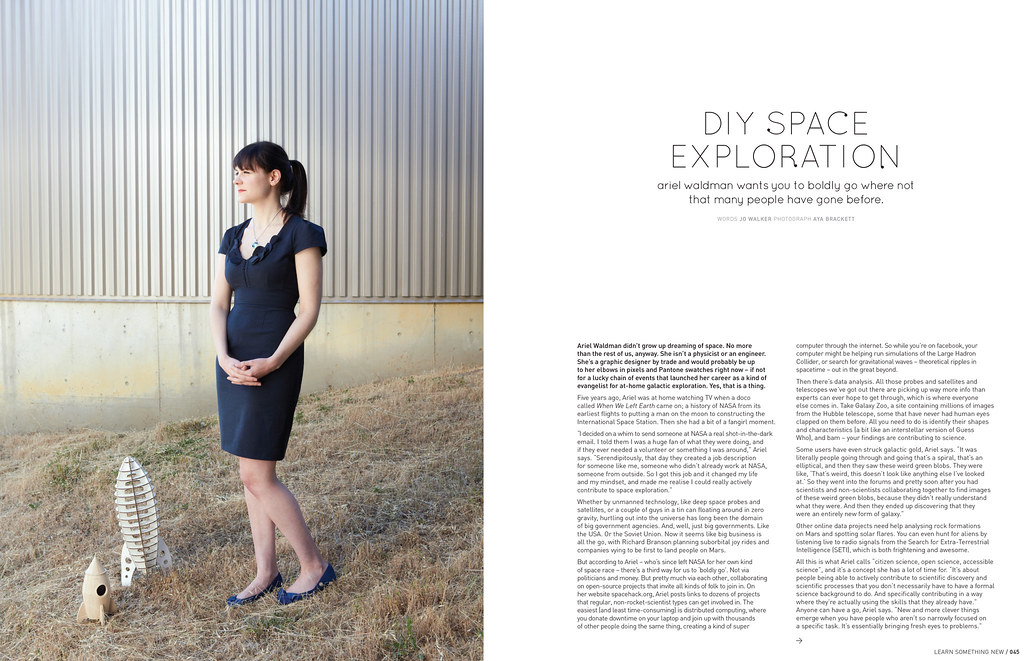
If you're in Australia, you'll probably see me down there this month! Sadly, not in person, but you can find me in the latest issue of Frankie which has been voted Australia's best fashion magazine of 2012. I'm incredibly flattered to be included!I would love to see more fashion magazines feature women science hackers and show how accessible it is to make weird fun things with science. I grew up always loving fashion magazines and plastering them on my walls. I still remember discovering Alexander McQueen and thinking how amazing his creations were and how I'd love to make my own weird things someday. I suppose in being a 'spacehacker', I achieved that in some way (if only I could create a cosmonaut-inspired runway show!). I think it'd be a huge win for a fashion magazine to do an amazing photoshoot showing off biohackers, spacehackers, neurohackers, etc. with crazy contraptions, and then turn around to their readers and say 'you can do this, too!'.
Coming back from Paris a couple weeks ago, I watched the In Vogue: The Editor's Eye documentary on the plane, and one quote from Nicole Kidman was spot on about the impact of fashion magazines: "They give us access to another world. They give us access to dreams." This is what both space exploration and fashion have been to me. I think it's due time that the "science hacker" dream be depicted in fashion and show how anyone now can have access to space exploration and science.
Honored at the White House
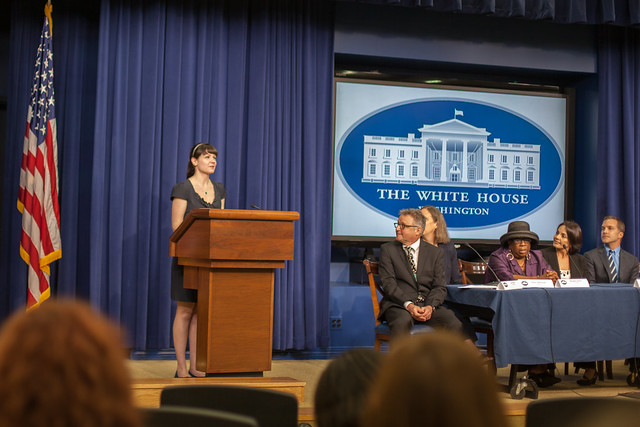 I spoke at the White House today. I never expected to say that!Today, the White House honored twelve people across the country that they considered to be "Champions Of Change" in Citizen Science. I was one of the twelve who were nominated and then selected. I do feel quite honored. I was asked to write a few words on my thoughts about citizen science for the White House blog – here's what I had to say.I was also so pleased to have an entourage of friends and family who came to see me speak at the White House. I specifically invited two of my girl friends to join me, as they are very much my own personal champions of change in citizen science: Yasaman Sheri and Lisa Ballard. Yasaman is an industrial designer turned biohacker who experiments with making synthetic skins out of kombucha cultures. Lisa is a developer at the SETI Institute who works on making planetary data from space probes more easily accessible and she works with me on Spacehack.org in her spare time. Both are awesome women that I highly recommend.
I spoke at the White House today. I never expected to say that!Today, the White House honored twelve people across the country that they considered to be "Champions Of Change" in Citizen Science. I was one of the twelve who were nominated and then selected. I do feel quite honored. I was asked to write a few words on my thoughts about citizen science for the White House blog – here's what I had to say.I was also so pleased to have an entourage of friends and family who came to see me speak at the White House. I specifically invited two of my girl friends to join me, as they are very much my own personal champions of change in citizen science: Yasaman Sheri and Lisa Ballard. Yasaman is an industrial designer turned biohacker who experiments with making synthetic skins out of kombucha cultures. Lisa is a developer at the SETI Institute who works on making planetary data from space probes more easily accessible and she works with me on Spacehack.org in her spare time. Both are awesome women that I highly recommend. My citizen science A-team: Eri Gentry (who was also honored by the White House), Yasaman Sheri, myself and Lisa Ballard
My citizen science A-team: Eri Gentry (who was also honored by the White House), Yasaman Sheri, myself and Lisa Ballard


